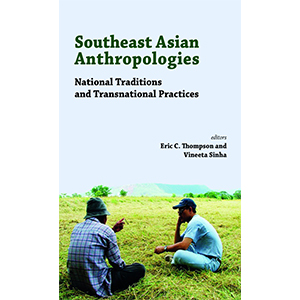Southeast Asian Anthropologies: National Traditions and Transnational Practices
Anthropology is a flourishing discipline in Southeast Asia. Southeast Asian Anthropologies renders visible the development of national traditions and transnational practices of anthropology across the region. The authors are practising anthropologists and Southeast Asian scholars with decades of experience working in the intellectual traditions and institutions that have taken root in Southeast Asia since the mid-twentieth century.
Anthropology’s self-criticism of the colonial, postcolonial and neo-colonial conditions of its own production remains relevant for Southeast Asia. There has been a vigorous debate and a wide range of suggestions on what might be done to de-center the Euro-, andro-, hetero- and other centrisms of the discipline from an emerging world anthropologies perspective. But actually transforming anthropology requires practice beyond mere critique. The chapters in this volume focus on practices and paradigms of anthropologists working from and within Southeast Asia.
Three overlapping issues are addressed in these pages: First, the historical development of unique traditions of research, scholarship, and social engagement across diverse anthropological communities of the region, which have adopted and adapted different anthropological trends to their local circumstances; Second, the opportunities and challenges faced by Southeast Asian anthropologists as they practise their craft in different institutional and political contexts; and Third, the emergence of locally-grounded, intra-regional, transnational linkages and practices undertaken by Southeast Asian-based anthropologists.
RM125.00
Out of stock
Description
Anthropology is a flourishing discipline in Southeast Asia. Southeast Asian Anthropologies renders visible the development of national traditions and transnational practices of anthropology across the region. The authors are practising anthropologists and Southeast Asian scholars with decades of experience working in the intellectual traditions and institutions that have taken root in Southeast Asia since the mid-twentieth century.
Anthropology’s self-criticism of the colonial, postcolonial and neo-colonial conditions of its own production remains relevant for Southeast Asia. There has been a vigorous debate and a wide range of suggestions on what might be done to de-center the Euro-, andro-, hetero- and other centrisms of the discipline from an emerging world anthropologies perspective. But actually transforming anthropology requires practice beyond mere critique. The chapters in this volume focus on practices and paradigms of anthropologists working from and within Southeast Asia.
Three overlapping issues are addressed in these pages: First, the historical development of unique traditions of research, scholarship, and social engagement across diverse anthropological communities of the region, which have adopted and adapted different anthropological trends to their local circumstances; Second, the opportunities and challenges faced by Southeast Asian anthropologists as they practise their craft in different institutional and political contexts; and Third, the emergence of locally-grounded, intra-regional, transnational linkages and practices undertaken by Southeast Asian-based anthropologists.
Publisher: NUS Press
Paperback
2019
ISBN: 9789814722964






